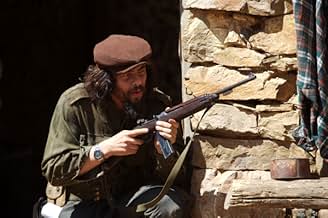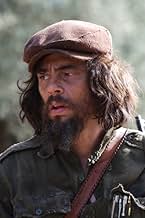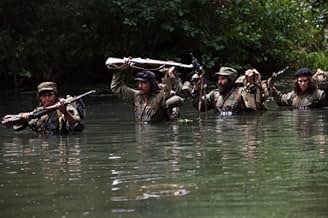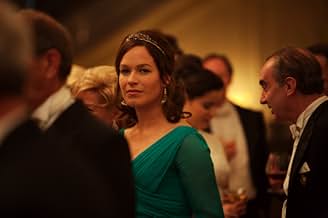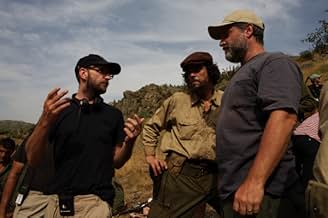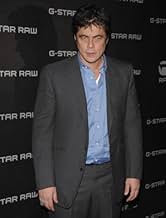IMDb RATING
6.8/10
36K
YOUR RATING
In 1967, Ernesto 'Che' Guevara leads a small partisan army to fight an ill-fated revolutionary guerrilla war in Bolivia, South America.In 1967, Ernesto 'Che' Guevara leads a small partisan army to fight an ill-fated revolutionary guerrilla war in Bolivia, South America.In 1967, Ernesto 'Che' Guevara leads a small partisan army to fight an ill-fated revolutionary guerrilla war in Bolivia, South America.
- Director
- Writers
- Stars
- Awards
- 2 wins & 7 nominations total
Demián Bichir
- Fidel Castro
- (as Demian Bichir)
- Director
- Writers
- All cast & crew
- Production, box office & more at IMDbPro
Featured reviews
In terms of a (loose) description, part one of this two part series covers Ernesto Che Guevara's travels, alongside Fidel Castro, from Mexico to Cuba and his rise, organizing and leading his fighters, finally culminating in Castro's seizure of power in Cuba from Fulgencio Batista. The second film, rather different in tone and spirit from its companion, focuses primarily on his efforts in Bolivia, tracking his gradual downfall Little of Guevara's personal life aside from his activism is detailed, which is both a little surprising and somewhat vexing, especially when one considers the combined duration of both films is well over four hours. There is, of course, nothing inherently wrong with a filmed biography limiting itself to just one or two particular aspects of its subject's diverse life; such an approach can ensure better focus on the material, as opposed to risking the potential the audience may become lost in a rambling, disjointed account in which too few events in the subjects life are explored with adequate depth and clarity.
The pair of films, overall, are most memorable for their sequences of Guevara's guerrilla army training and battling in the jungles and waters of Cuba and Bolivia and especially for the climactic battles near the end of each film. They may each be overlong and not chart as much territory as they perhaps should. Some may wish they would delve further into the obscure intimacies of his life, especially for the benefit of those already familiar with his activism. Others may feel the film does not question his militant means often or strongly enough. No, the films are not perfect, but lesser movies than these have been well received and, as such, these two are worth a look.
The pair of films, overall, are most memorable for their sequences of Guevara's guerrilla army training and battling in the jungles and waters of Cuba and Bolivia and especially for the climactic battles near the end of each film. They may each be overlong and not chart as much territory as they perhaps should. Some may wish they would delve further into the obscure intimacies of his life, especially for the benefit of those already familiar with his activism. Others may feel the film does not question his militant means often or strongly enough. No, the films are not perfect, but lesser movies than these have been well received and, as such, these two are worth a look.
Part Two picks up... not where the last film left off. As part of the quasi-conventionality of Steven Soderbergh's epic 4+ hour event, Che's two stories are told as classic "Rise" and "Fall" scenarios. In Part Two, Che Guevara, leaving his post as a bureaucrat in Cuba and after a failed attempt in the Congo (only in passing mentioned in the film), goes down to Bolivia to try and start up another through-the-jungle style revolution. Things don't go quite as well planned, at all, probably because of Che's then notorious stature as a Communist and revolutionary, and in part because of America's involvement on the side of the Bolivian Government, and, of course, that Castro wasn't really around as a back-up for Che.
As it goes, the second part of Che is sadder, but in some ways wiser than the first part. Which makes sense, as Guevara has to endure low morale from his men, betrayals from those around him, constant mistakes by grunts and nearby peasants, and by ultimately the enclosing, larger military force. But what's sadder still is that Guevara, no matter what, won't give in. One may see this as an incredible strength or a fatal flaw- maybe both- but it's also clear how one starts to see Che, if not totally more fully rounded, then as something of a more sympathetic character. True, he did kill, and executed, and felt justified all the way. And yet it starts to work on the viewer in the sense of a primal level of pity; the sequence where Guevara's health worsens without medicine, leading up to the shocking stabbing of a horse, marks as one of the most memorable and satisfying of any film this year.
Again, Soderbergh's command of narrative is strong, if, on occasion, slightly sluggish (understandable due to the big running time), and one or two scenes just feel totally odd (Matt Damon?), but these are minor liabilities. Going this time for the straight color camera approach, this is almost like a pure militia-style war picture, told with a great deal of care for the men in the group, as well as Guevara as the Lord-over this group, and how things dwindle down the final scene. And as always, Del-Toro is at the top of his game, in every scene, every beat knowing this guy so well- for better and for worse- that he comes about as close to embodiment as possible. Overall, the two parts of Che make up an impressive package: history as drama in compelling style, good for an audience even if they don't know Che or, better, if they don't think highly of him. It's that special. 8.5/10
As it goes, the second part of Che is sadder, but in some ways wiser than the first part. Which makes sense, as Guevara has to endure low morale from his men, betrayals from those around him, constant mistakes by grunts and nearby peasants, and by ultimately the enclosing, larger military force. But what's sadder still is that Guevara, no matter what, won't give in. One may see this as an incredible strength or a fatal flaw- maybe both- but it's also clear how one starts to see Che, if not totally more fully rounded, then as something of a more sympathetic character. True, he did kill, and executed, and felt justified all the way. And yet it starts to work on the viewer in the sense of a primal level of pity; the sequence where Guevara's health worsens without medicine, leading up to the shocking stabbing of a horse, marks as one of the most memorable and satisfying of any film this year.
Again, Soderbergh's command of narrative is strong, if, on occasion, slightly sluggish (understandable due to the big running time), and one or two scenes just feel totally odd (Matt Damon?), but these are minor liabilities. Going this time for the straight color camera approach, this is almost like a pure militia-style war picture, told with a great deal of care for the men in the group, as well as Guevara as the Lord-over this group, and how things dwindle down the final scene. And as always, Del-Toro is at the top of his game, in every scene, every beat knowing this guy so well- for better and for worse- that he comes about as close to embodiment as possible. Overall, the two parts of Che make up an impressive package: history as drama in compelling style, good for an audience even if they don't know Che or, better, if they don't think highly of him. It's that special. 8.5/10
Ironically the most talked-about American film in the 2008 New York Film Festival is 98% in Spanish. The extra-long film's controversy began at the Cannes Festival. There were love-hate notices, and considerable doubts about commercial prospects. As consolation the star, Benicio Del Toro, got the Best Actor award there. I'm talking about Steven Soderbergh's 'Che,' of course. That's the name it's going by in this version, shown in New York as at Cannes in two 2-hour-plus segments without opening title or end credits. 'Che' is certainly appropriate since Ernesto "Che" Guevara is in almost every scene. Del Toro is impressive, hanging in reliably through thick and thin, from days of glorious victory in part one to months of humiliating defeat in part two, appealing and simpatico in all his varied manifestations, even disguised as a bald graying man to sneak into Bolivia. It's a terrific performance; one wishes it had a better setting.
If you are patient enough to sit through the over four hours, with an intermission between the two sections, there are rewards. There's an authentic feel throughout--fortunately Soderbergh made the decision to film in Spanish (though some of the actors, oddly enough in the English segments especially, are wooden). You get a good outline of what guerrilla warfare, Che style, was like: the teaching, the recruitment of campesinos, the morality, the discipline, the hardship, and the fighting--as well as Che's gradual morphing from company doctor to full-fledged military leader. Use of a new 9-pound 35 mm-quality RED "digital high performance cine camera" that just became available in time for filming enabled DP Peter Andrews and his crew to produce images that are a bit cold, but at times still sing, and are always sharp and smooth.
The film is in two parts--Soderbergh is calling them two "films," and the plan is to release them commercially as such. First is 'The Argentine,' depicting Che's leadership in jungle and town fighting that led up to the fall of Havana in the late 50's, and the second is 'Guerrilla,' and concerns Che's failed effort nearly a decade later in Bolivia to spearhead a revolution, a fruitful mission that led to Guevara's capture and execution in 1967. The second part was to have been the original film and was written first and, I think, shot first. Producer Laura Bickford says that part two is more of a thriller, while part one is more of an action film with big battle scenes. Yes, but both parts have a lot in common--too much--since both spend a large part of their time following the guerrillas through rough country. Guerrilla an unmitigated downer since the Bolivian revolt was doomed from the start. The group of Cubans who tried to lead it didn't get a friendly reception from the Bolivian campesinos, who suspected foreigners, and thought of the Cuban communists as godless rapists. There is a third part, a kind of celebratory black and white interval made up of Che's speech at the United Nations in 1964 and interviews with him at that time, but that is inter-cut in the first segment. The first part also has Fidel and is considerably more upbeat, leading as it does to the victory in Santa Clara in 1959 that led to the fall of the dictatorship of Fulgencio Batista in Cuba.
During 'Guerilla' I kept thinking how this could indeed work as a quality European-style miniseries, which might begin with a shortened version of Walter Salles's 'Motorcycle Diaries' and go on to take us to Guevara's fateful meeting with Fidel in Mexico and enlistment in the 26th of July Movement. There could be much more about his extensive travels and diplomatic missions. This is far from a complete picture of the man, his childhood interest in chess, his lifelong interest in poetry, the books he wrote; even his international fame is only touched on. And what about his harsh, cruel side? Really what Soderbergh is most interested in isn't Che, but revolution, and guerrilla warfare. The lasting impression that the 4+ hours leave is of slogging through woods and jungle with wounded and sick men and women and idealistic dedication to a the cause of ending the tyranny of the rich. Someone mentioned being reminded of Terrence Malick's 'The Tin Red Line,' and yes, the meandering, episodic battle approach is similar; but 'The Thin Red Line' has stronger characters (hardly anybody emerges forcefully besides Che), and it's a really good film. This is an impressive, but unfinished and ill-fated, effort.
This 8-years-gestating, heavily researched labor of love (how many more Ocean's must come to pay for it?) is a vanity project, too long for a regular theatrical release and too short for a miniseries. Radical editing--or major expansion--would have made it into something more successful, and as it is it's a long slog, especially in the second half.
It's clear that this slogging could have been trimmed down, though it's not so clear what form the resulting film would have taken--but with a little bit of luck it might have been quite a good one.
If you are patient enough to sit through the over four hours, with an intermission between the two sections, there are rewards. There's an authentic feel throughout--fortunately Soderbergh made the decision to film in Spanish (though some of the actors, oddly enough in the English segments especially, are wooden). You get a good outline of what guerrilla warfare, Che style, was like: the teaching, the recruitment of campesinos, the morality, the discipline, the hardship, and the fighting--as well as Che's gradual morphing from company doctor to full-fledged military leader. Use of a new 9-pound 35 mm-quality RED "digital high performance cine camera" that just became available in time for filming enabled DP Peter Andrews and his crew to produce images that are a bit cold, but at times still sing, and are always sharp and smooth.
The film is in two parts--Soderbergh is calling them two "films," and the plan is to release them commercially as such. First is 'The Argentine,' depicting Che's leadership in jungle and town fighting that led up to the fall of Havana in the late 50's, and the second is 'Guerrilla,' and concerns Che's failed effort nearly a decade later in Bolivia to spearhead a revolution, a fruitful mission that led to Guevara's capture and execution in 1967. The second part was to have been the original film and was written first and, I think, shot first. Producer Laura Bickford says that part two is more of a thriller, while part one is more of an action film with big battle scenes. Yes, but both parts have a lot in common--too much--since both spend a large part of their time following the guerrillas through rough country. Guerrilla an unmitigated downer since the Bolivian revolt was doomed from the start. The group of Cubans who tried to lead it didn't get a friendly reception from the Bolivian campesinos, who suspected foreigners, and thought of the Cuban communists as godless rapists. There is a third part, a kind of celebratory black and white interval made up of Che's speech at the United Nations in 1964 and interviews with him at that time, but that is inter-cut in the first segment. The first part also has Fidel and is considerably more upbeat, leading as it does to the victory in Santa Clara in 1959 that led to the fall of the dictatorship of Fulgencio Batista in Cuba.
During 'Guerilla' I kept thinking how this could indeed work as a quality European-style miniseries, which might begin with a shortened version of Walter Salles's 'Motorcycle Diaries' and go on to take us to Guevara's fateful meeting with Fidel in Mexico and enlistment in the 26th of July Movement. There could be much more about his extensive travels and diplomatic missions. This is far from a complete picture of the man, his childhood interest in chess, his lifelong interest in poetry, the books he wrote; even his international fame is only touched on. And what about his harsh, cruel side? Really what Soderbergh is most interested in isn't Che, but revolution, and guerrilla warfare. The lasting impression that the 4+ hours leave is of slogging through woods and jungle with wounded and sick men and women and idealistic dedication to a the cause of ending the tyranny of the rich. Someone mentioned being reminded of Terrence Malick's 'The Tin Red Line,' and yes, the meandering, episodic battle approach is similar; but 'The Thin Red Line' has stronger characters (hardly anybody emerges forcefully besides Che), and it's a really good film. This is an impressive, but unfinished and ill-fated, effort.
This 8-years-gestating, heavily researched labor of love (how many more Ocean's must come to pay for it?) is a vanity project, too long for a regular theatrical release and too short for a miniseries. Radical editing--or major expansion--would have made it into something more successful, and as it is it's a long slog, especially in the second half.
It's clear that this slogging could have been trimmed down, though it's not so clear what form the resulting film would have taken--but with a little bit of luck it might have been quite a good one.
Possibly the most brilliant thing about Che: Part Two, as we begin to integrate it with Part One in our minds, is that there is no clarification of why Che chose to confidentially abscond from Cuba after the revolution, no allusion to his experience in the Congo, no clarification of why he chose Bolivia as his subsequent setting for a coup d'etat, no allusion to the political decisions he made as a young man motorcycling across South America, which Walter Salles has given prominent familiarity. Extraordinary focus is given to Che meeting the volunteers who accompany his guerrilla factions. Yet hardly any endeavor is made to single them out as individuals, to establish involved relationships. He is reasonably unreasonable. Che drives an unbreakable doctrine to leave no wounded man behind. But there is no feeling that he is deeply directly concerned with his men. It is the concept.
In Part 1, in Cuba, the rebels are welcomed by the people of the villages, given food and cover, supported in what grows to be a victorious revolution. Here, in Bolivia, not much understanding is apparent. Villagers expose him. They protect government troops, not his own. When he expounds on the onesidedness of the government medical system, his audience appears uninterested. You cannot lead a people into revolution if they do not want to comply. Soderbergh shows U.S. military advisers working with the Bolivians, but doesn't fault the United States for Che's collapse. Che seems to have just misfigured his fight and the place where he wanted to have it.
In showcasing both wars, Soderbergh doesn't build his battle scenes as actions with specific results. Che's men attack and are attacked. They exchange fire with faraway assailants. There is generally a cut to the group in the aftershock of combat, its death toll not paused for. This is not a war movie. It is about one man's reasonably unreasonable drive to endure. There is no elaborate cinematography. Soderbergh looks firmly at Che's inflexible dedication. There are remarkable sporadic visceral shots, but being few they are all the more powerful, such as Che's POV shot during his final beats. There is an abundance of the terrain, where these men live for weeks at a time, and the all-consuming effect is of languor, Guevara himself having malaria part of the time.
Benicio Del Toro, one of the film's producers, gives a champion's performance, not least because it's modest. He isn't portrayed as the cutting edge like most epic heroes. In Cuba, he arises in conquest, in Bolivia, he falls to the reverse, and occasionally is actually difficult to distinguish behind a tangle of beard and hair. Del Toro illustrates not so much an identity as an attitude. You may think the film is too long. I think there's a genuine cause for its breadth. Guevara's affairs in Cuba and particularly Bolivia was not a sequence of episodes and sketches, but an undertaking of staying power that might virtually be called insane. In the end, Che as a whole or in parts is a commercially ballsy movie, one where its director begins by understanding the limits innate in cinematic biography and working progressively within those means.
In Part 1, in Cuba, the rebels are welcomed by the people of the villages, given food and cover, supported in what grows to be a victorious revolution. Here, in Bolivia, not much understanding is apparent. Villagers expose him. They protect government troops, not his own. When he expounds on the onesidedness of the government medical system, his audience appears uninterested. You cannot lead a people into revolution if they do not want to comply. Soderbergh shows U.S. military advisers working with the Bolivians, but doesn't fault the United States for Che's collapse. Che seems to have just misfigured his fight and the place where he wanted to have it.
In showcasing both wars, Soderbergh doesn't build his battle scenes as actions with specific results. Che's men attack and are attacked. They exchange fire with faraway assailants. There is generally a cut to the group in the aftershock of combat, its death toll not paused for. This is not a war movie. It is about one man's reasonably unreasonable drive to endure. There is no elaborate cinematography. Soderbergh looks firmly at Che's inflexible dedication. There are remarkable sporadic visceral shots, but being few they are all the more powerful, such as Che's POV shot during his final beats. There is an abundance of the terrain, where these men live for weeks at a time, and the all-consuming effect is of languor, Guevara himself having malaria part of the time.
Benicio Del Toro, one of the film's producers, gives a champion's performance, not least because it's modest. He isn't portrayed as the cutting edge like most epic heroes. In Cuba, he arises in conquest, in Bolivia, he falls to the reverse, and occasionally is actually difficult to distinguish behind a tangle of beard and hair. Del Toro illustrates not so much an identity as an attitude. You may think the film is too long. I think there's a genuine cause for its breadth. Guevara's affairs in Cuba and particularly Bolivia was not a sequence of episodes and sketches, but an undertaking of staying power that might virtually be called insane. In the end, Che as a whole or in parts is a commercially ballsy movie, one where its director begins by understanding the limits innate in cinematic biography and working progressively within those means.
A lot of the problem many people have with this movie is that they seem to think that the story should have been more entertaining (ignoring it is based on a true story) or ranting against a film that glorifies Che (which it really doesn't). This film is very close to Jon Anderson's definitive bio on Che and gets the story right. Soderburgh does an excellent job of setting the mood for the unraveling debacle that was Che's Bolivian adventure. You really get the impression of the total timidity and bewilderment of the Bolvian peasant to Che's revolutionary ideas or of the difficulties that his men faced with hunger and the terrain. Sorry to bore the attention challenged movie fan out there but that was how it happened. So don't go into this movie expecting a Rambo shoot em up, its a true story!
Did you know
- TriviaWas the first feature-length movie to be shot with the Red One Digital Camera, as well as the first mainstream film to be shot in the 4K resolution. (Part One was also shot with this camera, but Part Two was shot first so Benicio Del Toro could gradually regain the weight he lost for this film)
- GoofsAt his execution, Che was shot a total of nine times, not three as shown in the movie.
- Quotes
Ernesto Che Guevara: To survive here, to win... you have to live as if you've already died.
- SoundtracksBalderrama
Lyrics by Manuel José Castilla
Music by Gustavo Leguizamon
Performed by Mercedes Sosa
Courtesy of Universal Music
Copyright (c) by Lagos Editorial (Warner/Chappell Music Argentina)
Details
Box office
- Budget
- $40,000,000 (estimated)
- Gross US & Canada
- $748,555
- Opening weekend US & Canada
- $61,070
- Dec 14, 2008
- Gross worldwide
- $8,638,163
- Runtime2 hours 15 minutes
- Color
- Sound mix
- Aspect ratio
- 1.85 : 1
Contribute to this page
Suggest an edit or add missing content

Top Gap
By what name was Che - 2ème partie - Guerilla (2008) officially released in India in English?
Answer

